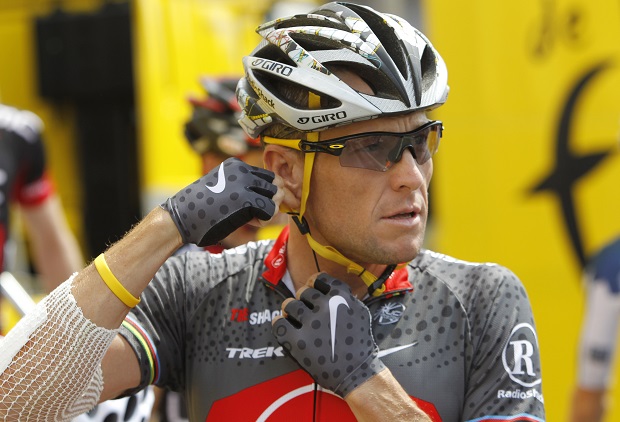
In this July 6, 2010, file photo, Lance Armstrong arrives prior to the start of the third stage of the Tour de France cycling race in Wanze, Belgium. Athletic apparel giant Nike Inc. is fighting subpoenas for documents and witness depositions in the federal government’s lawsuit against former cyclist Lance Armstrong. Armstrong and the government both have subpoenaed Nike, which was one of Armstrong’s major sponsors until dropping him in 2012 after his use of performance enhancing drugs was exposed. AP FILE PHOTO
AUSTIN, Texas — Athletic apparel giant Nike Inc. is fighting subpoenas for financial documents and witness depositions in the federal government’s lawsuit against former cyclist Lance Armstrong, arguing they are irrelevant to the case and could compromise trade secrets.
Armstrong and the government both have subpoenaed Nike, which was one of Armstrong’s major sponsors until it dropped him in 2012 after his use of performance-enhancing drugs was exposed.
The government is suing Armstrong to recover more than $30 million the US Postal Service paid to sponsor his teams from 1998-2004. Damages could go as high as $100 million. The lawsuit was initially filed by former Armstrong teammate Floyd Landis, who stands to collect a portion of any penalty against Armstrong.
The subpoenas seek Nike financial records and documents of any discussions about Armstrong’s doping.
In court filings this week in Portland, Oregon, the company asked a federal judge to modify the subpoenas to sharply limit evidence and keep any documents or testimony provided secret under a protective order.
Armstrong wants records of how profitable Nike’s sponsorship was for the company, and hopes to draw parallels to his claim that the US Postal Service made more money off him than it paid him. Nike lawyers said the company’s sponsorship records are tightly held trade secrets, and potential disclosure would help competitors.
“Nike takes considerable effort to maintain the secrecy of its records regarding athlete sponsorships,” company lawyers wrote.
The company also argued that its sponsorship of Armstrong is irrelevant to any deal he and his team had with the Postal Service.
The government wants Nike to turn over any communications with Armstrong about performance-enhancing drug use and records the company previously gave a federal criminal grand jury that investigated Armstrong in 2010-2011. Nike lawyers insisted the company didn’t know about Armstrong’s doping, which he has now admitted publicly and in sworn testimony.
The subpoena dispute was set for a Sept. 29 hearing.

